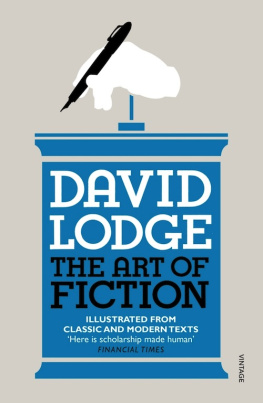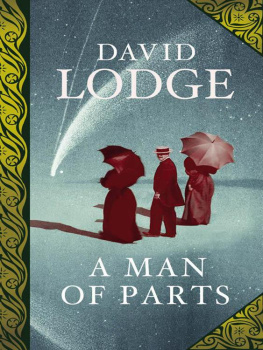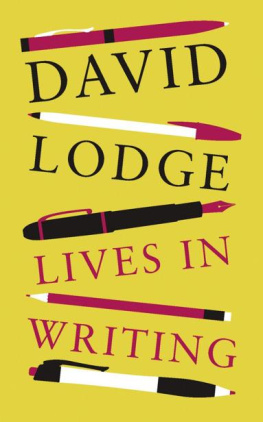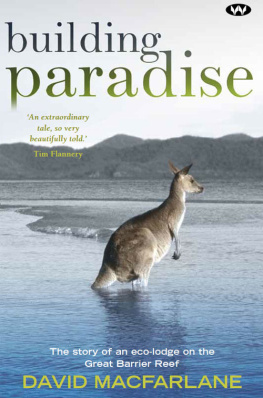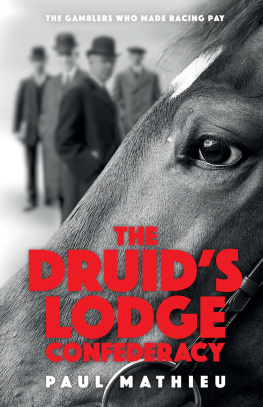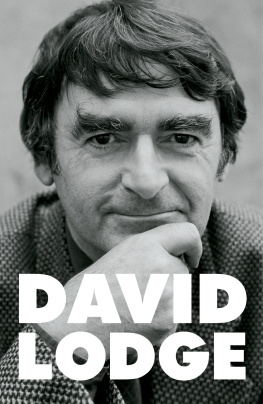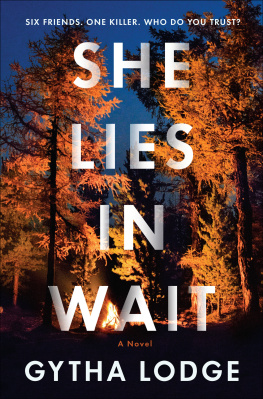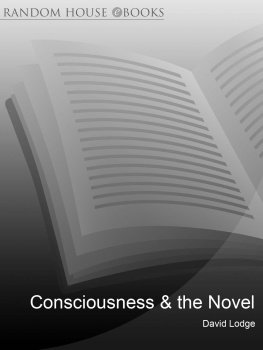David Lodge - The Art of Fiction
Here you can read online David Lodge - The Art of Fiction full text of the book (entire story) in english for free. Download pdf and epub, get meaning, cover and reviews about this ebook. year: 2012, publisher: Random House, genre: Detective and thriller. Description of the work, (preface) as well as reviews are available. Best literature library LitArk.com created for fans of good reading and offers a wide selection of genres:
Romance novel
Science fiction
Adventure
Detective
Science
History
Home and family
Prose
Art
Politics
Computer
Non-fiction
Religion
Business
Children
Humor
Choose a favorite category and find really read worthwhile books. Enjoy immersion in the world of imagination, feel the emotions of the characters or learn something new for yourself, make an fascinating discovery.
- Book:The Art of Fiction
- Author:
- Publisher:Random House
- Genre:
- Year:2012
- Rating:5 / 5
- Favourites:Add to favourites
- Your mark:
- 100
- 1
- 2
- 3
- 4
- 5
The Art of Fiction: summary, description and annotation
We offer to read an annotation, description, summary or preface (depends on what the author of the book "The Art of Fiction" wrote himself). If you haven't found the necessary information about the book — write in the comments, we will try to find it.
The Art of Fiction — read online for free the complete book (whole text) full work
Below is the text of the book, divided by pages. System saving the place of the last page read, allows you to conveniently read the book "The Art of Fiction" online for free, without having to search again every time where you left off. Put a bookmark, and you can go to the page where you finished reading at any time.
Font size:
Interval:
Bookmark:
Contents
This ebook is copyright material and must not be copied, reproduced, transferred, distributed, leased, licensed or publicly performed or used in any way except as specifically permitted in writing by the publishers, as allowed under the terms and conditions under which it was purchased or as strictly permitted by applicable copyright law. Any unauthorised distribution or use of this text may be a direct infringement of the authors and publishers rights and those responsible may be liable in law accordingly.
Version 1.0
Epub ISBN 9781448137794
www.randomhouse.co.uk
Published by Vintage 2011
2 4 6 8 10 9 7 5 3 1
Copyright David Lodge, 1992
David Lodge has asserted his right under the Copyright, Designs and Patents Act 1988 to be identified as the author of this work
This book is sold subject to the condition that it shall not, by way of trade or otherwise, be lent, resold, hired out, or otherwise circulated without the publishers prior consent in any form of binding or cover other than that in which it is published and without a similar condition, including this condition, being imposed on the subsequent purchaser
First published in Great Britain by The Independent on Sunday 19912
This edition first published by Martin Secker & Warburg Ltd 1992
Vintage
Random House, 20 Vauxhall Bridge Road,
London SW1V 2SA
www.vintage-books.co.uk
Addresses for companies within The Random House Group Limited can be found at: www.randomhouse.co.uk/offices.htm
The Random House Group Limited Reg. No. 954009
A CIP catalogue record for this book is available from the British Library
ISBN 9780099554240
www.vintage-books.co.uk
About the Author
David Lodges novels include Changing Places, Small World, Nice Work, Thinks , Author, Author, Deaf Sentence and, most recently, A Man of Parts. He has also written stage plays and screenplays, and several books of literary criticism, including The Art of Fiction, Consciousness and the Novel and The Year of Henry James.
Also by David Lodge
Fiction
The Picturegoers
Ginger, Youre Barmy
The British Museum is Falling Down
Out of the Shelter
Changing Places
How Far Can You Go?
Small World
Nice Work
Paradise News
Therapy
Home Truths
Thinks
Author, Author
Deaf Sentence
A Man of Parts
Criticism
Language of Fiction
The Novelist at the Crossroads
The Modes of Modern Writing
Working with Structuralism
After Bakhtin
Essays
Write On
The Practice of Writing
Consciousness and the Novel
The Year of Henry James
Drama
The Writing Game
Home Truths
To John Blackwell
genius among editors (The Writing Game, Act Two Scene Two)

Preface
For twelve months between 1990 and 1991, the poet James Fenton contributed a weekly column to the book pages of The Independent on Sunday entitled Ars Poetica, the title of a famous treatise on poetry by the Roman poet Horace. Each week Fenton printed a short poem or extract from a poem, and wrote a commentary designed to throw light on both the text and some aspect of the art of poetry in general. Early in 1991 the literary editor of the newspaper, Blake Morrison, rang me up and asked if I would be interested in writing something similar about prose fiction when James Fenton had finished his stint.
Usually I take time to consider journalistic proposals, and more often than not I say no in the end; but on this occasion I had decided to say yes almost before Blake had finished his pitch. For nearly thirty years, between 1960 and 1987, I was an academic as well as a novelist, teaching English Literature at Birmingham University. Over that time I published several books of literary criticism, mainly concerned with novels and The Novel, and for many of those years I offered a course called Form in Fiction. After taking early retirement from my university post in 1987 I found that I had little inclination or incentive to go on writing criticism for an essentially academic audience; but I felt that I still had things to say on the art of fiction and the history of the novel that might be of interest to a more general reading public, and sensed that a weekly newspaper column might provide an ideal platform.
I settled quite quickly on a format that was topic-centred rather than text-centred, since a novel, unlike many excellent poems, cannot be quoted in its entirety in a newspaper article. Each week I chose one or two short extracts from novels or stories, classic and modern, to illustrate some aspect of The Art of Fiction. (Following on Fentons Ars Poetica, this was a more or less inevitable name for the series, and I have retained it for the book in spite of some uneasiness at trespassing on the title of a venerated essay by Henry James.) With a few exceptions Jane Austen, George Eliot, Henry James I took my examples from a different author, or brace of authors, each week. I confined myself almost exclusively to English and American writers, because this is, as academics say, my field and I am less confident of doing accurate close analysis of novels outside it. I have commented on some of these passages before in print, but not in exactly the same terms.
I began with Beginning and always intended to end with Ending. In between these two, one weeks article sometimes suggested the topic for the following week, but I did not design the series as a systematic, progressive introduction to the theory of the novel. In revising the pieces for book publication I have inserted a number of cross-references, and provided an index, which should compensate for the somewhat random sequence of topics. Once a teacher, always a teacher. Although the book is intended for the general reader I have deliberately used, with explanations, a number of technical terms which may be unfamiliar to such a reader, because you cannot analyse a literary text without an appropriate descriptive vocabulary, any more than you can strip down an engine without an appropriate set of tools. Some of these terms are modern, like intertextuality and metafiction, and some are ancient, like the names of figures of speech in classical rhetoric (metonymy, synecdoche etc.), which modern linguistics has not yet improved upon. An alternative title for this book, if Wayne Booth hadnt used it already, would be The Rhetoric of Fiction. I have always regarded fiction as an essentially rhetorical art that is to say, the novelist or short story-writer persuades us to share a certain view of the world for the duration of the reading experience, effecting, when successful, that rapt immersion in an imagined reality that Van Gogh caught so well in his painting The Novel Reader. Even novelists who, for their own artistic purposes, deliberately break that spell have to cast it first.
The original articles were written to a prescribed length, but I usually submitted my copy slightly over-long, leaving the task of trimming it to fit the available space in the capable hands of Blake Morrison and his assistant Jan Dalley. (I should like to record here my appreciation of the skill and tact with which they carried out this task.) In revising the articles for book publication I have restored some of the passages which they were obliged to cut, and some which I deleted myself from earlier drafts, and have added new material, both illustrative and argumentative, to nearly all of them. One item has been replaced by a new piece on Chapters. To throw light on the nuts and bolts of fiction, I have drawn more frequently on my own experience as a writer than seemed either appropriate or practicable in the original newspaper articles.
Next pageFont size:
Interval:
Bookmark:
Similar books «The Art of Fiction»
Look at similar books to The Art of Fiction. We have selected literature similar in name and meaning in the hope of providing readers with more options to find new, interesting, not yet read works.
Discussion, reviews of the book The Art of Fiction and just readers' own opinions. Leave your comments, write what you think about the work, its meaning or the main characters. Specify what exactly you liked and what you didn't like, and why you think so.

